Climate change is having such a negative impact on weather events and other incidents that Public Health Sudbury & Districts is preparing and planning on how people and communities can adapt and survive the changing conditions.
The issue was the subject of a special report presented to the Public Health Sudbury and Districts (PHSD) board of health on Sept. 21.
The report was outlined by Jane Mantyla, a health promoter at PHSD, who said that current conditions are indeed affecting peoples' health such as extreme heat, freezing rain, storms and floods, wildfires and illness and disease transmitted by insects.
Mantyla said part of the role of public health is to raise awareness and encourage people to take protective action.
"On social media, we employ seasonal posts targeting climate change hazards including heat illness, sun safety, air quality, vector-borne illness, flood, emergency preparedness, blue-green algae and food safety. We also issue news releases, which are commonly picked up by local media," said Mantyla.
"For example, this year we responded to wildfire, smoke and heat impacts. By proactively actively contacting operators of rec camps, school boards, daycares, and summer day camps.”
In her report, Mantyla added that climate change is having an increasing impact on community health. She said extreme heat days are on the rise and the number of days per year that we are impacted by 30-plus Celsius temperatures will triple in the next 10 years.
Heavy and intense rainfall and spring flooding are also risks, she said.
Freezing rain is predicted to increase by 60 per cent by 2050, she added.
Mantyla said vector-borne viruses such as Lyme disease and West Nile virus are moving more northward each year. She said food and water-borne illnesses are expected to increase because of warmer temperatures and new precipitation patterns.
Wildfires, caused by humans and lightning, are both expected to increase by 20 per cent and 62 per cent respectively, by the year 2040, said Mantyla.
Social change
But public health is more than responding to physical climate change. Mantyla said public health must also be aware of social changes so that people who are poor or disadvantaged can also be protected and find safe spaces to protect themselves.
"Issues affecting priority populations like substandard living conditions, homelessness, low income discrimination and violence bring about adverse health impacts, increased exposure to climate change hazards and as you can imagine, hamper the person's ability to protect themselves and recover from setbacks," Mantyla said.
She said helping people adapt to social change is becoming part of the new vocabulary for public health.
"Creating safe spaces, and building equity are important solutions for climate resiliency. In the face of weather emergencies and heat waves, we need safe spaces for people who identify as 2SLGBTQ-plus, to access shelter, access services free from discrimination, and we need to work together with them to reduce isolation."
Mantyla said additional support will be required to provide support and protection for immigrants, older adults, people living in poverty and people living in isolation.
"Related to equity and poverty reduction, we advocate for basic income and paid sick days. Related to housing supply and homelessness sector, we bring forward consideration of hazards like extreme heat and emergency preparedness," said Mantyla.
"And we work towards strategies that protect against direct harm and build resilience," she added.
Mantyla said in order to achieve change, health unit staff are being prepared and trained.
"Our staff require knowledge of inequities and good practices. As an agency, we're improving our office and clinic spaces to be inclusive and safe. We're building capacity in our staff around diversity, equity, inclusion, and truth and reconciliation," said Mantyla.
Through solutions like poverty reduction, equity, creating safe spaces and inclusion, individuals are better able to take the steps they need to protect themselves from direct hazards of climate change, and our communities are more resilient."
Len Gillis covers health care and mining for Sudbury.com.
